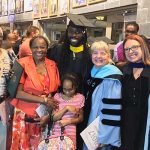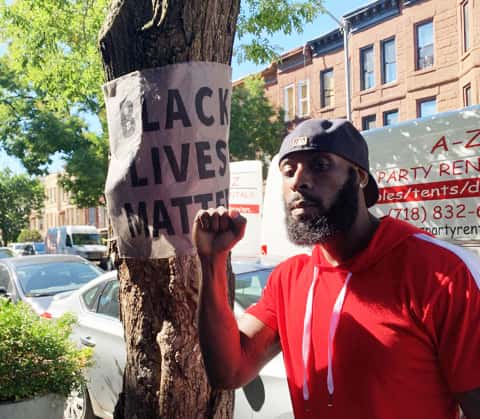

The epiphany emerged gradually, slowly, in the form of a persistent voice. Sometimes this voice is described as loud and clear, summoning the hearer to take up his life’s mission. Others describe it as a gently commanding whisper. Tai Olasanoye, ‘04, M.S. ‘17, simply ignored it.
He heard it as a kind of humming and felt its magnetic pull, but he didn’t wonder at it. It was too ironic to even entertain the possibility of what it wanted him to do, but the more he ignored it, the more it pestered him.
As a native of Hartford, Conn., Olasanoye had been, as he put it himself, a “feral, reckless youth” from the inner city. He didn’t like school, roamed the streets, and disregarded authority. He had a habit of instigating fights to settle scores, even if there was no score to settle, and rubbed elbows with felons. Education was the farthest thing from his mind, though his father, a stern Nigerian immigrant, would often demand he read and study.
“I was like, ‘Why are you always asking me about studying? Who cares about that? Why is that so important?”’ Olasanoye says.
At the time, Olasanoye, still young and reeling from his parents’ divorce, didn’t understand the power of education and the constellation of possibilities that it maps out. He barely graduated from high school, scraping by on Cs, Ds, and Fs, and could never maintain the minimum GPA to qualify for the football team. Instead, he dabbled in underage drinking and drugs, the lawlessness of the streets appealing to him more than anything the classroom could offer.
Olasanoye spent a couple of years in this manner, just “hanging out,” as he describes it, but even that lost its luster over time. When he finally sat down to examine his life, he quickly concluded that he needed to change the trajectory of his future. His sisters were all in college; childhood friends either had met violent deaths on the streets or were serving prison sentences; and Olasanoye figured there had to be more to life than what he’d seen up to that point.
“When I saw my friends go to jail, I started to ask, ‘What am I doing with this?”’ Olasanoye reminisces. “This can’t be like this; there’s got to be more.”

Bad grades and behavioral problems, however, ended up eroding people’s confidence in Olasanoye’s academic abilities. Most of his closest relatives and friends did not think he had the drive to go through with college. “When I told my mom I wanted to go to college, she laughed at me,” he says, hurt creeping into his voice. “She laughed.”
His mother’s sneering dismissal ultimately cinched Olasanoye’s decision to enroll as an undergraduate student at Southern in the early 2000s. “It might be for all the wrong reasons that I went to college, but I wanted to prove them wrong,” he admits.
Once at Southern, Olasanoye struggled with classes and was eventually put on academic probation. At the end of each semester, he’d talk himself into quitting, certain that he’d made a mistake. This went on until the start of his junior year when Olasanoye’s friend, who lived in his dorm, reminded him that he had only a handful of semesters left — hardly worth the trouble of quitting. On the other hand, whenever he confided his insecurities to his mother, she would insist that he come home. But Olasanoye didn’t go home; it would feel too much like a defeat.
“As an athlete, I never considered myself a quitter, so I looked at this as a challenge to myself,” he says with a sheepish grin on his face. His friend’s reality check, coupled with a desire to silence his naysayers, prompted Olasanoye to buckle down and raise his GPA to the minimum required for graduation.
Finally, Olasanoye accomplished what he set out to do — he walked across the stage on Commencement Day, a B.A. in communication to his name. With a diploma in hand and a stronger sense of self, Olasanoye set out on the first leg of a journey that continues to this day — he packed up his bags and headed south to Florida.
In Florida, Olasanoye drifted in and out of insurance and customer service jobs, hoping the change of scene would help him collect his thoughts and try “to find [his] way.” It only reinforced what his inner voice had told him to be true but he had denied for so long. “I wanted to get my master’s degree in special education,” he says. Shortly after, he returned home to Connecticut and made his way back to Southern — of all places.
One afternoon, as he wandered Davis Hall, he ran into Dr. López-Velásquez, associate professor of special education and coordinator of undergraduate programs. Olasanoye was lost, and Dr. López-Velásquez, who had been passing by, stopped to offer him assistance. Relieved at seeing a friendly face, Olasanoye soon jumped at the opportunity to ask about the process of becoming a certified teacher. This was to become a turning point in his career.
“She guided me through the first steps,” he says. He later met Dr. Kara Faraclas, chairperson of special education, and Dean Stephen Hegedus, dean of the College of Education. Olasanoye credits all three for his subsequent success in the education program and his 2016 nomination to the Dean’s Student Leadership Group (SLG). Each cohort in the SLG is selected for its outstanding personal and academic qualities, as well as for demonstrating leadership skills both on campus and in the community at large.
“I can’t put into words what these people mean to me. They were they every step of the way, laying out the path for me to do this,” he says.
Southern plays an equally significant role in Olasanoye’s academic and professional growth. He says that his training at Southern has made him a viable candidate for the workforce and a strong graduate school applicant. “I wouldn’t be in a situation where I get to have my dream job and my dreams fulfilled if it weren’t for my professors and Southern,” he says. “I’ll always be Southern strong.”
Over two decades to the day since he began his undergraduate studies, Olasanoye, now an English teacher in charge of his own classroom at ACES Whitney High School North, chuckles at the irony of it all. “I hated school when I was a kid, and I ended up working at a school,” he says.
When asked why he wanted to become a teacher, Olasanoye answers without missing a beat: “I didn’t have a Black male teacher until I got to college. I never saw education as an option for me.”
Among his students, mainly African-American males, Olasanoye is working hard to dispel stereotypes about what a teacher should look like. When he walks into his classroom on the first day of school, he is usually welcomed by expressions of incredulity. Some students whisper to each other or point to the diamond stud earrings glittering on Olasanoye’s earlobes, clearly impressed by them. Other gawk at his Nikes or electric guitar. The bold ones ask what everyone else is thinking aloud, “Could this really be our teacher?” Students, especially students of color, are not accustomed to having Black male teachers in the classroom, so seeing Olasanoye standing before them in cotton slacks, diamond studs, and Nikes comes as a shock.
“I like to pick their brains, so I ask them to describe what comes to mind when they think of a teacher,” he says. Most respond by saying teachers are white and either male or female. Sometimes they’re Black women. Almost none thinks a Black male could be a teacher. By this point, Olasanoye leans back against the edge of his desk, facing his class with his jaw set in a firm line. “I want you to get those ideas out of your head,” he tells them. “Don’t let anybody tell you that you have to look a certain way to be or do something.” This is his first step towards building rapport with his students.
Olasanoye belongs to a cadre of teachers intent on reforming prejudiced modes of thinking and encouraging more racial sensitivity. Students are not to blame, as Olasanoye makes clears, but those who have reinforced the view that teaching is exclusively a white profession.
According to Olasanoye, he and his teaching assistant have had awkward encounters with white colleagues at ACES. There have been times when newly hired social workers have stood in the doorway to his classroom, glanced around, and said, “I’m looking for the teacher, but I guess she’s not here.” Olasanoye usually sits speechless at his what is clearly a teacher’s desk.
“Either they think I look too young to be a teacher or they think I couldn’t possibly be the teacher,” he says. “This has happened on numerous occasions.”
Olasanoye has learned to brush off these brief, if not uncomfortable, interactions with coworkers, concerning himself instead with teaching students about the racial problems plaguing the country. He assigns them Ibram X. Kendi’s Stamped and George Orwell’s Animal Farm, and though the latter is not necessarily his favorite, he recognizes its importance to the curriculum.
As an English teacher, Olasanoye is aware of the precision and power of language to upend the status quo and usher in transformative change. The manner in which he addresses students, and his word choice, make the difference between disciplining a talkative child positively and losing his students’ respect.
Above all, Olasanoye strives to mold himself into the role model he wishes he’d had growing up, into someone his students could look up to and trust. “I talk to them like young adults,” he remarks. “Kids just want to feel that you care about them.” Olasanoye takes an interest in his students’ lives, bonding with them over hobbies, sports, and music. He also makes sure to warn them against the dangers of drugs and exhorts them to steer clear of them. “They need guidance, and I hope to provide that for them,” Olasanoye adds.
But all good things come to an end, because Olasanoye will be bidding his students at ACES farewell at the end of July, but it is for a good cause — to embark on the second leg of his journey as a teacher.
“I will be teaching ninth-grade English at Innovation Charter High School in New York,” he says, smiling widely. He plans on keeping in touch with his students via Zoom and is in talks with a colleague about hosting a Zoom meet between ACES and Innovation students, past and present students. “It’s a good way for Connecticut teenagers and New York teenagers to share their experiences,” he says.
As for the future, Olasanoye is already thinking about returning to Southern for a Sixth Year Certificate in Educational Leadership and Policy Studies. “I want to put myself in a position where I have the credentials to be an administrator if I want to,” he says. “That’s the next logical step.”
The classroom, however, is where Olasanoye’s heart is.
“I love to interact with students on a personal level,” he says. “You can have some of that as administrator, like when principals go around the building, but it’s still not as intimate as when you’re in there with them every day.”
There’s pride in his voice when he speaks of his class, not unlike a father boasting of his children’s accomplishments. More importantly, he is filled with excitement when he considers the ways in which he could inspire underprivileged students to harness the potential in them. Few believed in Olasanoye, but he is breaking the cycle by believing in all of his charges and pointing the way forward.
“They can be anything they set their minds to,” he concludes.